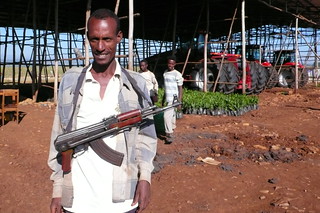On May 11, the UN approved new international rules to govern how land is acquired abroad. These Voluntary Guidelines (VGs), the outcome of several years of protracted negotiations, are a response to growing global  concern that nations and private investors are seizing large swaths of overseas agricultural land owned or used by small farmers and local communities for food, medicinal, or livelihood purposes. FAO head Jose Graziano da Silva describes the VGs as “a starting point that will help improve the often dire situation of the hungry and poor.”
It’s hard to quibble with the intent of the guidelines. They call for, among other things, protecting the land rights of local communities; promoting gender equality in land title acquisition; and offering legal assistance during land disputes.
Unfortunately, however, any utility deriving from the VGs will be strictly normative. As their name states explicitly, they are purely optional. A toothless set of non-obligatory rules will prove no match for a strategy that is striking both for its scale and for the tremendous power of its executioners.
Oxfam estimates that nearly 230 million hectares of land (an area equivalent to the size of Western Europe) have been sold or leased since 2001 (with most of these transactions occurring since 2008). According to GRAIN, a global land rights NGO, more than 2 million hectares were subjected to transactions during the first four months of 2012 alone. One of the largest proposed deals—an attempt by South Korea’s Daewoo corporation to acquire 1.3 million hectares of farmland in Madagascar—failed back in 2009. Still, even larger investments are being planned today, including a Brazilian effort to acquire a whopping 6 million hectares of land in Mozambique to produce corn and soy (Mozambique offered a concession last year).
Read the rest at Sustainable Security
concern that nations and private investors are seizing large swaths of overseas agricultural land owned or used by small farmers and local communities for food, medicinal, or livelihood purposes. FAO head Jose Graziano da Silva describes the VGs as “a starting point that will help improve the often dire situation of the hungry and poor.”
It’s hard to quibble with the intent of the guidelines. They call for, among other things, protecting the land rights of local communities; promoting gender equality in land title acquisition; and offering legal assistance during land disputes.
Unfortunately, however, any utility deriving from the VGs will be strictly normative. As their name states explicitly, they are purely optional. A toothless set of non-obligatory rules will prove no match for a strategy that is striking both for its scale and for the tremendous power of its executioners.
Oxfam estimates that nearly 230 million hectares of land (an area equivalent to the size of Western Europe) have been sold or leased since 2001 (with most of these transactions occurring since 2008). According to GRAIN, a global land rights NGO, more than 2 million hectares were subjected to transactions during the first four months of 2012 alone. One of the largest proposed deals—an attempt by South Korea’s Daewoo corporation to acquire 1.3 million hectares of farmland in Madagascar—failed back in 2009. Still, even larger investments are being planned today, including a Brazilian effort to acquire a whopping 6 million hectares of land in Mozambique to produce corn and soy (Mozambique offered a concession last year).
Read the rest at Sustainable Security
 concern that nations and private investors are seizing large swaths of overseas agricultural land owned or used by small farmers and local communities for food, medicinal, or livelihood purposes. FAO head Jose Graziano da Silva describes the VGs as “a starting point that will help improve the often dire situation of the hungry and poor.”
It’s hard to quibble with the intent of the guidelines. They call for, among other things, protecting the land rights of local communities; promoting gender equality in land title acquisition; and offering legal assistance during land disputes.
Unfortunately, however, any utility deriving from the VGs will be strictly normative. As their name states explicitly, they are purely optional. A toothless set of non-obligatory rules will prove no match for a strategy that is striking both for its scale and for the tremendous power of its executioners.
Oxfam estimates that nearly 230 million hectares of land (an area equivalent to the size of Western Europe) have been sold or leased since 2001 (with most of these transactions occurring since 2008). According to GRAIN, a global land rights NGO, more than 2 million hectares were subjected to transactions during the first four months of 2012 alone. One of the largest proposed deals—an attempt by South Korea’s Daewoo corporation to acquire 1.3 million hectares of farmland in Madagascar—failed back in 2009. Still, even larger investments are being planned today, including a Brazilian effort to acquire a whopping 6 million hectares of land in Mozambique to produce corn and soy (Mozambique offered a concession last year).
Read the rest at Sustainable Security
concern that nations and private investors are seizing large swaths of overseas agricultural land owned or used by small farmers and local communities for food, medicinal, or livelihood purposes. FAO head Jose Graziano da Silva describes the VGs as “a starting point that will help improve the often dire situation of the hungry and poor.”
It’s hard to quibble with the intent of the guidelines. They call for, among other things, protecting the land rights of local communities; promoting gender equality in land title acquisition; and offering legal assistance during land disputes.
Unfortunately, however, any utility deriving from the VGs will be strictly normative. As their name states explicitly, they are purely optional. A toothless set of non-obligatory rules will prove no match for a strategy that is striking both for its scale and for the tremendous power of its executioners.
Oxfam estimates that nearly 230 million hectares of land (an area equivalent to the size of Western Europe) have been sold or leased since 2001 (with most of these transactions occurring since 2008). According to GRAIN, a global land rights NGO, more than 2 million hectares were subjected to transactions during the first four months of 2012 alone. One of the largest proposed deals—an attempt by South Korea’s Daewoo corporation to acquire 1.3 million hectares of farmland in Madagascar—failed back in 2009. Still, even larger investments are being planned today, including a Brazilian effort to acquire a whopping 6 million hectares of land in Mozambique to produce corn and soy (Mozambique offered a concession last year).
Read the rest at Sustainable Security 

